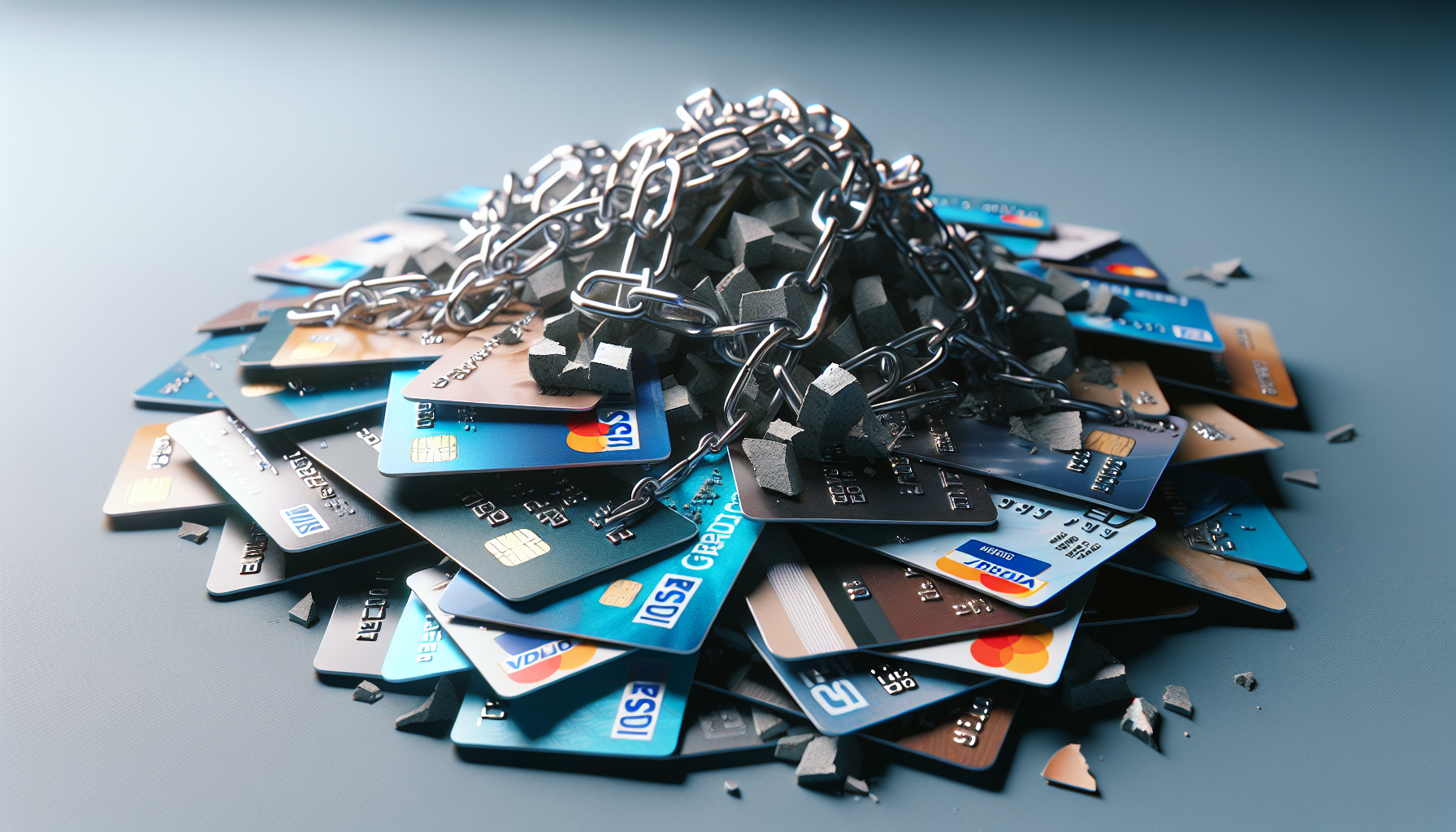
The ordeal of carrying debt can notably impede the journey to achieving financial freedom. It’s a prevalent belief that traversing today’s world debt-free is an insurmountable task.
Yet, this mindset is deeply flawed.
Entangling oneself in monetary obligations is not a prerequisite to contemporary living.
One crucial endeavor towards financial freedom is debt reduction. This step involves shrinking your financial liabilities, an endeavor that can be accomplished through a mix of disciplined budgeting, insightful financial planning, and seamless execution.
The conventional method of credit card payoff, a common debt reduction strategy, may seem singularly appealing and operative. Diversifying your approach to bankruptcy avoidance, an unconventional yet valuable method, may present a broader and more effective path. Common advice often given in topics of debt reduction, financial freedom, credit card payoff, bankruptcy avoidance, and loan settlement is to live below your means and prioritize paying off debts.
Understanding Debt Reduction Strategies
Understanding the concept of debt reduction is fundamental for effective debt management, a crucial aspect of financial planning. This strategy aims to minimize debts and liabilities, facilitating a secure financial future.
Acknowledging its significance can shield you from the damaging effects of accumulating financial burdens, improving credit score dramatically over time.
There are different debt reduction strategies designed to help manage your financial liabilities.
These include techniques such as tackling high-interest debts first, employing the snowball method, taking advantage of balance transfers on credit cards, and adopting bill consolidation. Each debt reduction approach provides unique advantages, tailored to suit your specific financial situation.
Besides these strategies, adopting a cash-only lifestyle can mark the start of a life unburdened by monetary obligations, which is a key part of debt management. This involves creating and strictly following a foolproof financial planning strategy. Simultaneously, establishing an emergency fund is crucial in debt management, bill consolidation, financial planning, improving credit score, and debt negotiation.

Achieving Financial Freedom Where to Start
Starting your journey towards financial freedom requires a clear understanding of your existing monetary situation. This step involves an authentic self-assessment of your financial standing, underlined by the principle of monetary discipline.
Often, this process leads to an eye-opening realization of past money mismanagement and the essential need for financial control.
Maintaining a firm grasp on personal finance management is pivotal.
This process involves thorough tracking of incomes and expenses, alongside understanding your fiscal commitments. Integrating budgeting techniques into your financial routine can drastically reshape your current monetary circumstances, fostering a step towards financial autonomy.
Once you start comprehending your financial habits, solutions for tackling arrears become clear. This process includes stringent austerity measures, prioritizing payments, and comprehensive financial planning.
Living within, or even below your means, and saving is a challenging task, yet it’s a crucial stride towards financial liberation. At the core of monetary discipline, budgeting techniques, tackling arrears, credit counseling, and personal finance management lies the key to financial stability and independence.
Financial Freedom
- Understanding your current financial situation is the first step towards financial freedom. This involves an honest self-assessment of your financial standing and monetary discipline.
- Personal finance management is crucial for financial independence. It involves tracking incomes and expenses, understanding fiscal commitments, and integrating budgeting techniques.
- Tackling arrears becomes easier once you comprehend your financial habits. This includes implementing austerity measures, prioritizing payments, and comprehensive financial planning.
- Living within or below your means and saving is a challenging yet essential step towards financial liberation.
Guidelines for Credit Card Payoff
Grasping the principles of credit card liabilities is fundamental to financial restructuring. The outcomes of credit card debt extend beyond immediate financial status, affecting long-term fiscal planning.
An intense solution like debt discharge may be utilized to wipe out this debt, but understanding the full weight of the situation is crucial initially.
Formulating a sound income management strategy is a pivotal step towards credit card payoff.
Options like consolidation, settlement, or bankruptcy can be considered based on individual circumstances. Each pathway holds specific advantages and shortcomings; however, choosing wisely leads to fiscal resiliency.
The following important phase towards credit repair involves managing debt obligations effectively. It’s imperative to significantly decrease the outstanding balances to avoid the snowballing effect of debt.
Adopting sustainable financial habits will aid in achieving a balanced, debt-free lifestyle.
Living without debt not only brings peace of mind but also promotes financial independence. Following financial restructuring, debt discharge, fiscal resiliency, income management, and credit repair, they were able to regain financial stability and growth.
Bankruptcy Avoidance A Comprehensive Guide
Comprehending the concept of bankruptcy, which essentially involves an individual or an organization legally asserting their inability to clear debts, is fundamental to wage garnishment prevention. This understanding is pivotal to eluding the negative ramifications of bankruptcy.
Recognizing the significance of evasion of bankruptcy is paramount for financial recovery.
One must strive to maintain financial stability, the cornerstone for bankruptcy avoidance.
Maintaining this stability connects directly with effective expenditure control. Sensible spending, when partnered with a consistent income, prevents the dreadful spiral towards bankruptcy.
Controlling your expenses is a non-negotiable requirement for overall financial health and to stop the impending threat of bankruptcy.
Part of the expenditure control process is reducing your liabilities.
This is best done through formulating an efficient debt settlement plan.
This strategy eases your financial distress and assists in regaining the reign over your monetary situation. The journey to wage garnishment prevention, expenditure control, and financial recovery involves creating effective saving strategies and a solid debt settlement plan.
Bankruptcy and Financial Stability
- Understanding bankruptcy is fundamental to wage garnishment prevention and financial recovery.
- Maintaining financial stability, primarily through effective expenditure control, is crucial to avoid bankruptcy.
- Reducing liabilities, especially through an efficient debt settlement plan, can help regain control over your financial situation.
- Creating effective saving strategies is an integral part of the journey to financial recovery and bankruptcy avoidance.
Loan Settlement and Its Benefits
Understanding loan settlement is crucial for optimizing wealth management. It’s essentially a negotiation process with the aim of liability reduction, creating a more manageable financial situation.
This method can be employed with various types of loans, including mortgage refinancing, fostering a sense of fiscal responsibility and freedom from monetary burdens.
Embarking on the journey of loan settlement brings about a life-transforming shift towards a debt-free existence.
The fruits of this approach are more than just financial; they extend to facets of personal life. Testimonials abound highlighting the profound positive influence of debt relief on individual lives, from liability reduction to improved quality of life.
Embracing loan settlement offers undeniable benefits. In addition to significant wealth management advantages, this strategy encompasses emotional and psychological bonuses.
It’s a more comprehensive solution compared to regular repayment methods, providing a path towards a financially independent future. Practical strategies can be employed in liability reduction, wealth management, mortgage refinancing, fiscal responsibility, and asset protection.
Effective Debt Management Techniques
The real essence of mastering debt management is more than just understanding financial obligations, it’s about controlling spendings. It entails recognizing the far-reaching psychological and financial impacts of owing money.
Prioritizing wealth accumulation and sidestepping financial pitfalls such as foreclosure are crucial for effectively dealing with debt.
It goes beyond simple earning and repayment—it necessitates a comprehensive methodical approach.
Crafting a well-defined plan for eradicating loans could catalyze pivotal changes in your life. This strategic plan, focused on debt release, aligns with your goals ultimately allowing a lifestyle devoid of financial burdens.
Such planning involves methodically marshalling your funds, allocating resources for loan repayment, and ensuring continuous financial rebalancing.
Implementing various debt management techniques forms the core of a systematic approach to reducing your financial liabilities. Real-life success stories echo the strength of these strategies such as controlling spendings, avoiding foreclosure, wealth accumulation, eradicating loans, and financial rebalancing, toward achieving a debt-free future.
| Debt Management Techniques | Benefits |
|---|---|
| Controlling Spendings | Prevents accumulation of unnecessary debt |
| Avoiding Foreclosure | Maintains ownership of assets and prevents additional financial distress |
| Wealth Accumulation | Provides financial security and reduces reliance on loans |
| Eradicating Loans | Eliminates financial liabilities and allows for financial freedom |
| Financial Rebalancing | Ensures a healthy and sustainable financial state |
The Importance of Bill Consolidation in Debt Elimination
Bill consolidation serves as an effective strategy for avoiding repossession of assets while embarking on the journey to fiscal solvency. By merging various bills into a singular payment, and deploying smart interest rate negotiation skills, this process simplifies financial management successfully, often reducing the monthly financial outflow.
Uniquely, bill consolidation stands apart from other debt reduction techniques due to its structured payment plan arrangement.
This arrangement offers a viable path to financial freedom, significantly contributing to the elimination of long-standing debts.
Achieving a debt-free life encompasses more than just bill consolidation; proper financial planning and following money saving tips also form integral components.
Despite its numerous benefits, many misconceptions envelop bill consolidation.
It is not a universal solution, as it may not be the ideal fit for everyone’s financial situation. Ultimately, having a clear understanding of its advantages and potential greatly aids in tailoring strategies for avoiding repossession, negotiating interest rates, arranging payment plans, providing money saving tips, and achieving fiscal solvency.

Get a Free Bankruptcy Case Evaluation